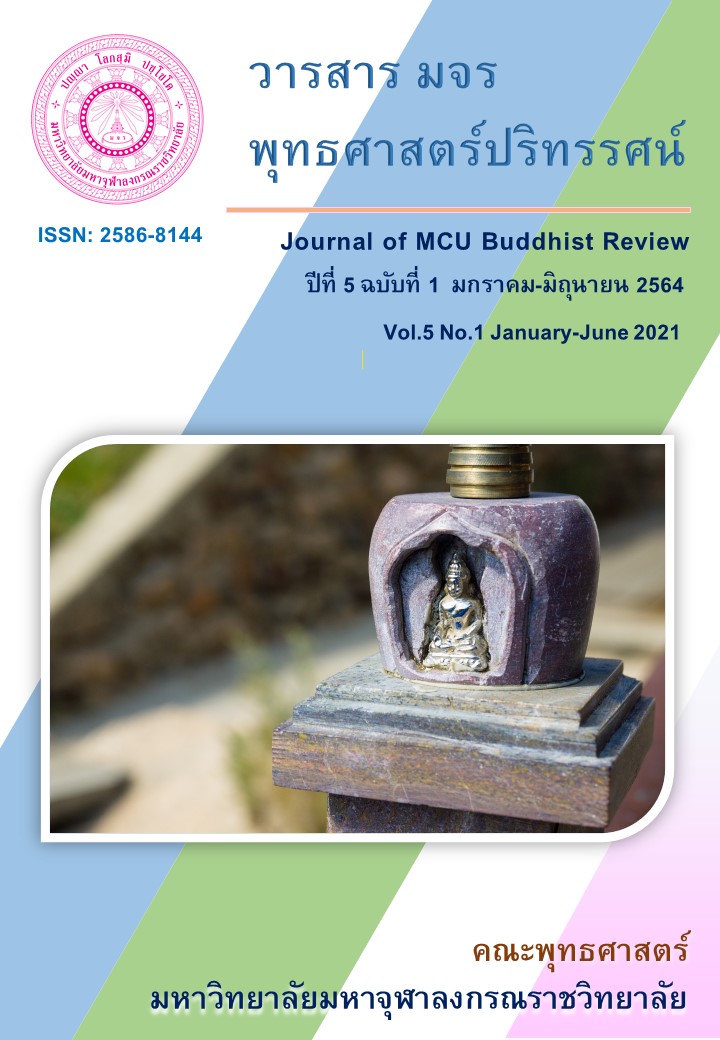พุทธกระบวนทรรศน์ต่อการเคารพศาลพระภูมิเจ้าที่ของศาสนาชาวบ้าน ในสังคมชาวพุทธไทย
Main Article Content
บทคัดย่อ
บทความวิชาการนี้มุ่งศึกษาค้นหาข้อสงสัยเชิงศาสนาชาวบ้านที่ว่า ในความเป็นอัตลักษณ์ของการเคารพนับถือศาสนาในลักษณะเอกภาพของความเป็นพหุภาพของชาวพุทธไทย พุทธกระบวนทรรศน์ควรมีความความเชื่อและแนวปฏิบัติอย่างไรกับศาลพระภูมิเจ้าที่จึงทำให้มีความกลมกลืนกัน ผลการศึกษา พบว่า ในทรรศนะพระพุทธศาสนาถือว่า พระภูมิเจ้าที่เป็นเทวดาชั้นจาตุมหาราชิกา ซึ่งเป็นเทวดาประเภทที่1 ในบรรดาเทวดา 6 จำพวกที่อยู่ใกล้ชิดกับมนุษย์มากที่สุด พระภูมิเจ้าที่จัดเป็นเทวดาจำพวกโอปปาติกะ ผู้เกิดขึ้นด้วยบุญกุศลของตนที่ได้กระทำไว้ในชาติที่แล้ว ๆ มาเอง โดยไม่ต้องอาศัยบิดามารดาเป็นผู้ให้กำเนิดเหมือนกับมนุษย์ มีสวรรค์วิมานเป็นที่อยู่ มีอาหาร เครื่องประดับและอายุอันเป็นทิพย์ตามระดับชั้นของสวรรค์ ความมุ่งหมายของการบูชาพระภูมิเจ้าที่ก็เพื่อแสดงถึงความกตัญญูกตเวทีที่มีต่อเทวดาที่ช่วยอารักษ์แผ่นดินของเรา เป็นการเน้นเตือนสติสัมปชัญญะของเหล่าพุทธบริษัท 4 ว่าไม่ให้ประมาทด้วยการถึงพร้อมแห่งสัทธาญาณสัมปยุตในการดำเนินชีวิตอย่างมีเหตุผลตามกฎแห่งกรรม แล้วนำมาพัฒนาตนเองให้ประกอบคุณงามความดีอันจะนำไปสูการเป็นเทวดา
Article Details
- บทความที่ได้รับการตีพิมพ์เป็นลิขสิทธิ์ของวารสาร มจร พุทธศาสตร์ปริทรรศน์
- ข้อความใดๆ ที่ปรากฎในบทความที่ได้รับการตีพิมพ์ในวารสาร ถือเป็นความรับผิดชอบของผู้เขียนบทความ และข้อคิดเห็นนั้นไม่ถือว่าเป็นทัศนะและความรับผิดชอบของกองบรรณาธิการวารสาร มจร พุทธศาสตร์ปริทรรศน์
เอกสารอ้างอิง
จารุวรรณ ธรรมวัตร. (2538). ภูมิปัญญาอีสาน. มหาสารคาม: นางนวลออฟเซ็ท.
จารุวรรณ ธรรมวัตร. (2540). คติชาวบ้านอีสาน. กรุงเทพฯ: อักษรวัฒนา.
บัวกนก วัชรปรีดา. (2544). การผสมผสานทางวัฒนธรรม:กรณีศึกษาบ้านท่ามะไฟหวาน ตำบลท่ามะไฟหวาน อำเภอแก้งคร้อง จังหวัดชัยภูมิ. ปริญญานิพนธ์ศิลปศาสตรมหาบัณฑิต สาขาวิชาวัฒนธรรมศึกษา. บัณฑิตวิทยาลัย มหาวิทยาลัยมหาสารคาม.
เบญจรัชต์ เมืองไทย. (2543). พิธีทรงเจ้า : พิธีกรรมกับโครงสร้างสังคมที่บ้านหนองขาว. วิทยานิพนธ์ศิลปศาสตรมหาบัณฑิต สาขาวิชาสังคมวิทยา : มหาวิทยาลัยศิลปากร.
บุญมี แท่นแก้ว. (2547). ประเพณีและพิธีกรรมพระพุทธศาสนา. กรุงเทพมหานคร : โอเดียน สโตร์.
พระธรรมปิฎก (ป.อ. ปยุตฺโต). (2538). เมืองไทยจะวิกฤต ถ้าคนไทยมีศรัทธาวิปริต. พิมพ์ครั้งที่ 2.กรุงเทพมหานคร: มูลนิธิพุทธธรรม.
พระพรหมโมลี (วิลาศ ญาณวโร). (2545). ภูมิวิลาสินี. กรุงเทพมหานคร : สำนักพิมพ์ดอกหญ้า.
พฤฒาจารย์วิพุธโยคะและพราหมณ์เฒ่ามเหศักดิ์. (2547). หลักการปลูกบ้านและการตั้งศาลต่างๆ. กรุงเทพมหานคร: สำนักพิมพ์ลานอโศก เพรส กรุ๊ป.
มหาจุฬาลงกรณราชวิทยาลัย.(2539). พระไตรปิฎกภาษาไทย ฉบับมหาจุฬาลงกรณราชวิทยาลัย. กรุงเทพมหานคร :โรงพิมพ์มหาจุฬาลงกรณราชวิทยาลัย.
มหามกุฏราชวิทยาลัย.(2534). พระธัมมปทัฏฐกถาแปล ภาค 6. พิมพ์ครั้งที่ 12กรุงเทพมหานคร : โรงพิมพมหามกุฏราชวิทยาลัย.
ศรีศักร วัลลิโภดม. (2560). พุทธศาสนาและความเชื่อในสังคมไทย. พิมพ์ครั้งที่ 2. กรุงเทพมหานคร: มูลนิธิเล็ก-ประไพ วิริยะพันธุ์.
อมรา พงศาพิชญ์. (2541). วัฒนธรรม ศาสนา และชาติพันธุ์:วิเคราะห์สังคมไทยแนวมานุษยวิทยา. พิมพ์ครั้งที่ 4 กรุงเทพฯ: สำนักพิมพ์แห่งจุฬาลงกรณ์มหาวิทยาลัย.
อรุณรัตน์ จันทะลือ.(2549). การสืบทอดความเชื่อเรื่องผีปู่ตาของเยาวชน ชาติพันธุ์โส้ บ้านกอก ตำบลผาเสวย อำเภอสมเด็จ จังหวัดกาฬสินธุ์. ปริญญานิพนธ์ศิลปศาสตรมหาบัณฑิต สาขาวิชาวัฒนธรรมศึกษา. บัณฑิตวิทยาลัย มหาวิทยาลัยมหาสารคาม.


